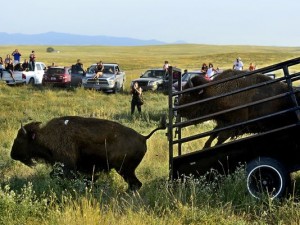
These bison have no cattle genes, are closest to ones that used to roam the Great Plains.
Karl Puckett, Great Falls (Mont.) Tribune August 23, 2013
FORT BELKNAP AGENCY, Mont. — Genetically pure bison are back at Fort Belknap Indian Reservation after a century’s absence.
Tribal officials released 34 wild bison Thursday that were free of cattle genes.
“It’s a great day for Indians and Indian Country,” said Mark Azure, who heads the bison program for the Gros Ventre and Assiniboine tribes that call the 1,055-square-mile reservation home.
Soon, animals in the herd were just brown specks on the horizon.
The bison were transported from Fort Peck Indian Reservation. Last year, officials from the Montana Department of Fish, Wildlife and Parks transplanted 70 bison from Yellowstone National Park to Fort Peck, ultimately planning to transport half of those to Fort Belknap. The Yellowstone animals are remnants of pure bison that once roamed the entire state.
Legal action from ranching and property-rights interests held up the transfer to Fort Belknap. But earlier this summer, the Montana Supreme Court said the transfers were legal, setting up Thursday’s bison return.
“It helped us, our ancestors, survive out here on the prairie,” Azure said of the bison. “So to be able to take that next step and return the favor, so to speak, it feels good.”
Of the 34 bison released in a 1,000-acre pasture with an 8-foot fence, all but two were hauled in a semi-trailer. Two big bulls were separated from the herd and transported separately. One cow was injured and was not released.
Tribal officials see the animals as a way to help manage bison that leave Yellowstone Park each year and are hazed or killed. They also hope to perpetuate long-term survival of the species in Montana.
Fort Belknap will manage a herd of about 150 of the wild bison and use them as seed stock for other agencies or tribes looking to reintroduce bison, said Mike Fox, a tribal councilman for the northern Montana reservation that has about 7,000 enrolled members.
“On the cultural side, they took care of us at one time, and now it’s time for us to take care of them,” he said.
Blood tests were taken Tuesday and Wednesday, and results came back Thursday with all of the animals negative for disease. When the results arrived, the bison drive from Fort Peck to Fort Belknap ensued.
Rows of pickup trucks and cars lined up Thursday as if they were at a drive-in movie to watch the animals charge out of the trailers through a chute and then to freedom. Some of the animals snorted and stomped inside the trailers while a few had to be prodded to escape. A pipe ceremony was conducted to welcome the animals.
“I wouldn’t miss this, gosh,” said Patty Quisno, a tribal council member.
Warren Bell, driver of the semi-trailer that hauled most of the bison, said he departed Fort Peck Indian Reservation 30 miles north of Wolf Point, Mont., for the 180-mile journey west to Fort Belknap. Azure, driving a pickup truck hauling a trailer with the two large bulls, was following about an hour behind.
“Well, they’re pure buffalo. They’re not mixed with anything,” Bell said of the high interest in the animals as kids and adults peered through slits in the trailer to get look at the big beasts at Horse Capture Community Park.
The bison were trucked first to a community gathering at the park, then on to the horse pasture, which is 16 miles south of Fort Belknap Agency. A police vehicle with a flashing light led the semi-trailer down the highway followed by a long line of vehicles.
The tribe has a commercial herd of 500 bison, but they have cattle genes. They’re kept in a separate pasture.
Fox said the last few bison that remained in the area disappeared around 1910.
“It’s a homecoming for the animals,” Fox said.
